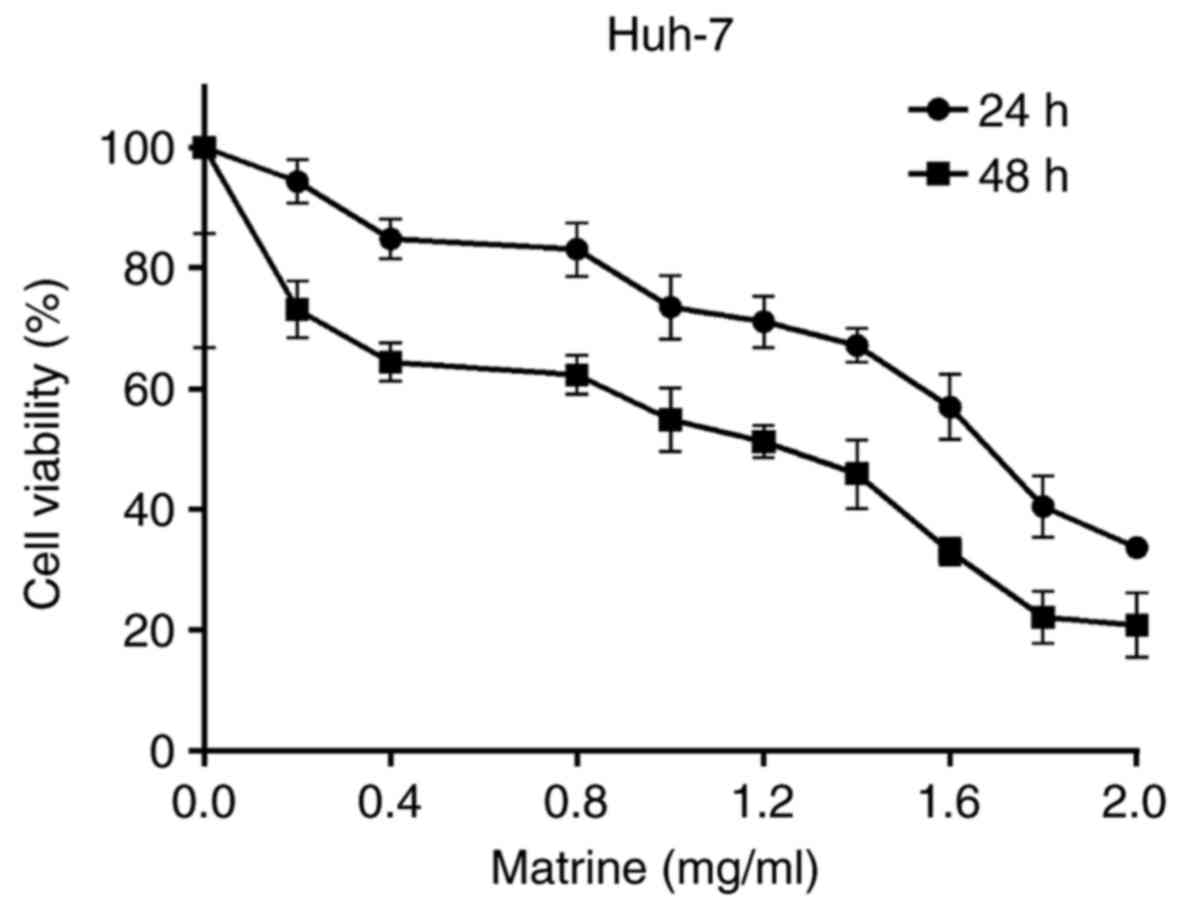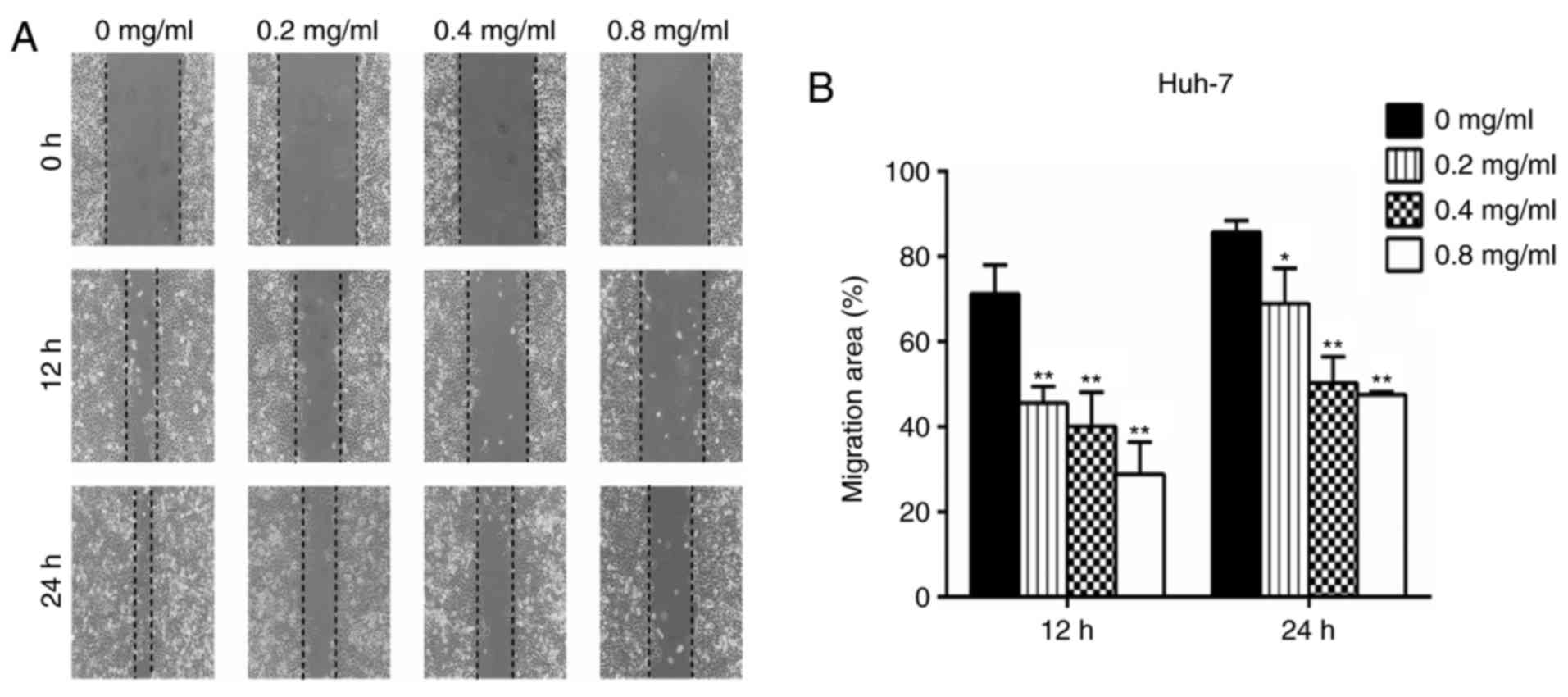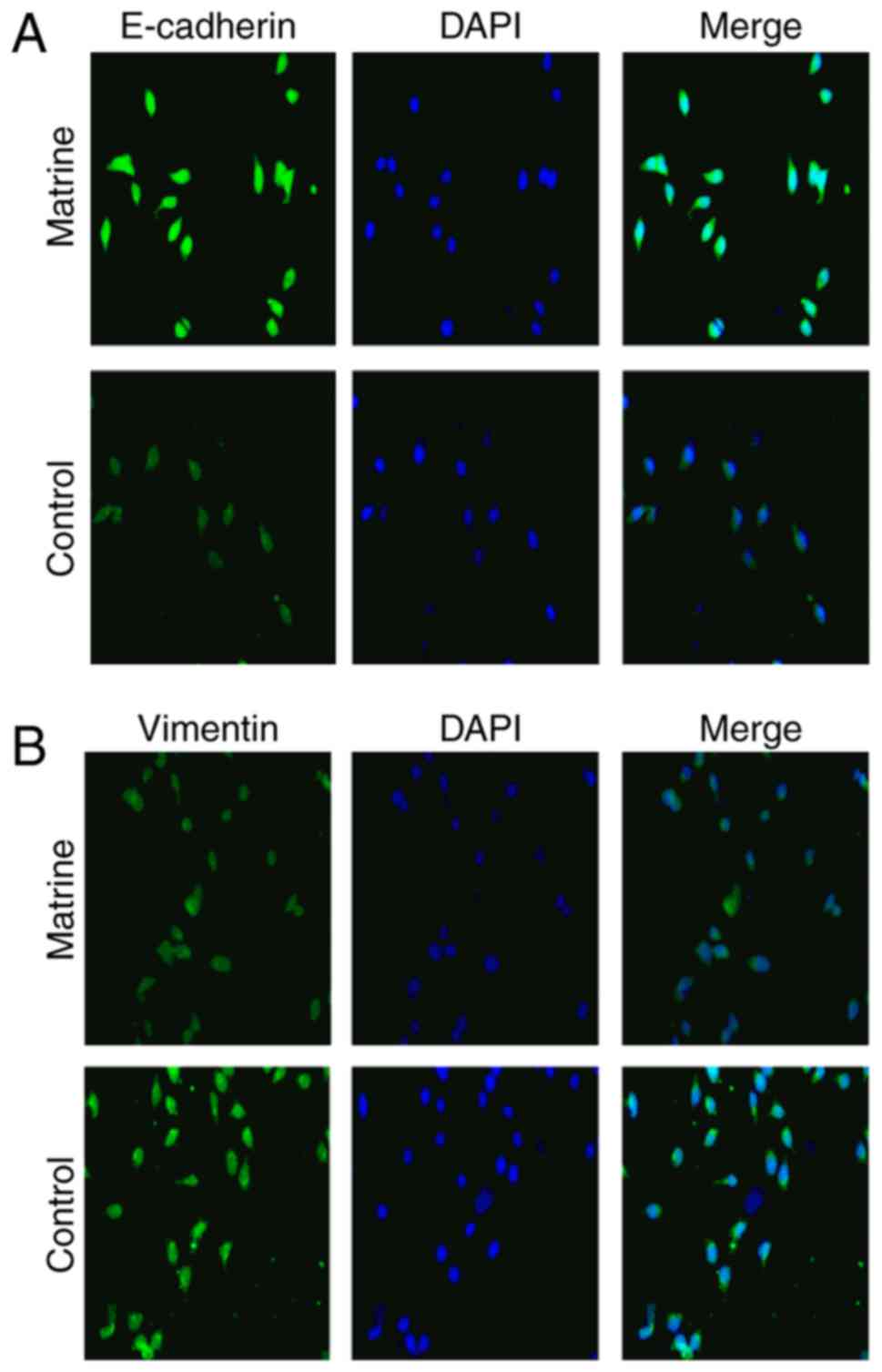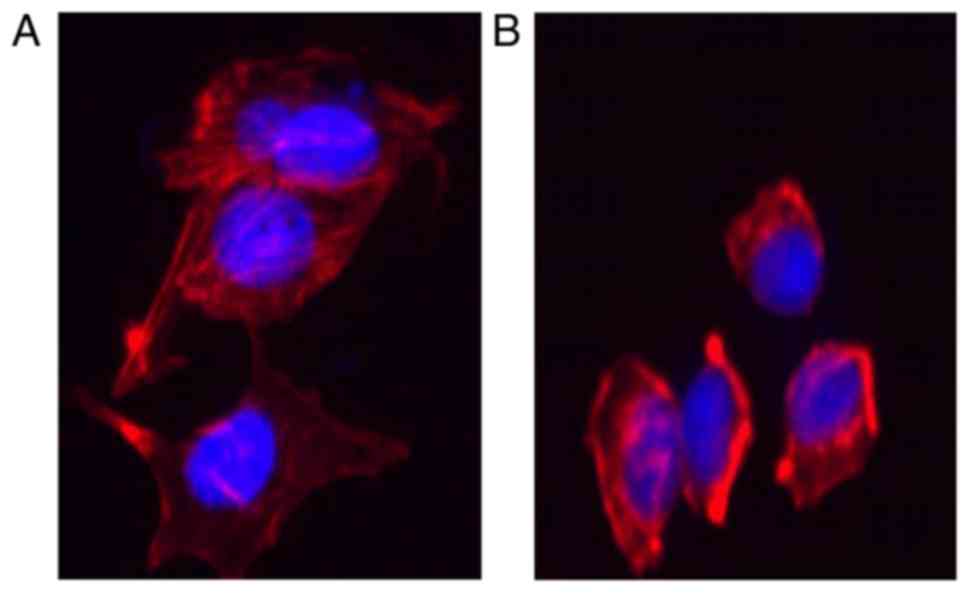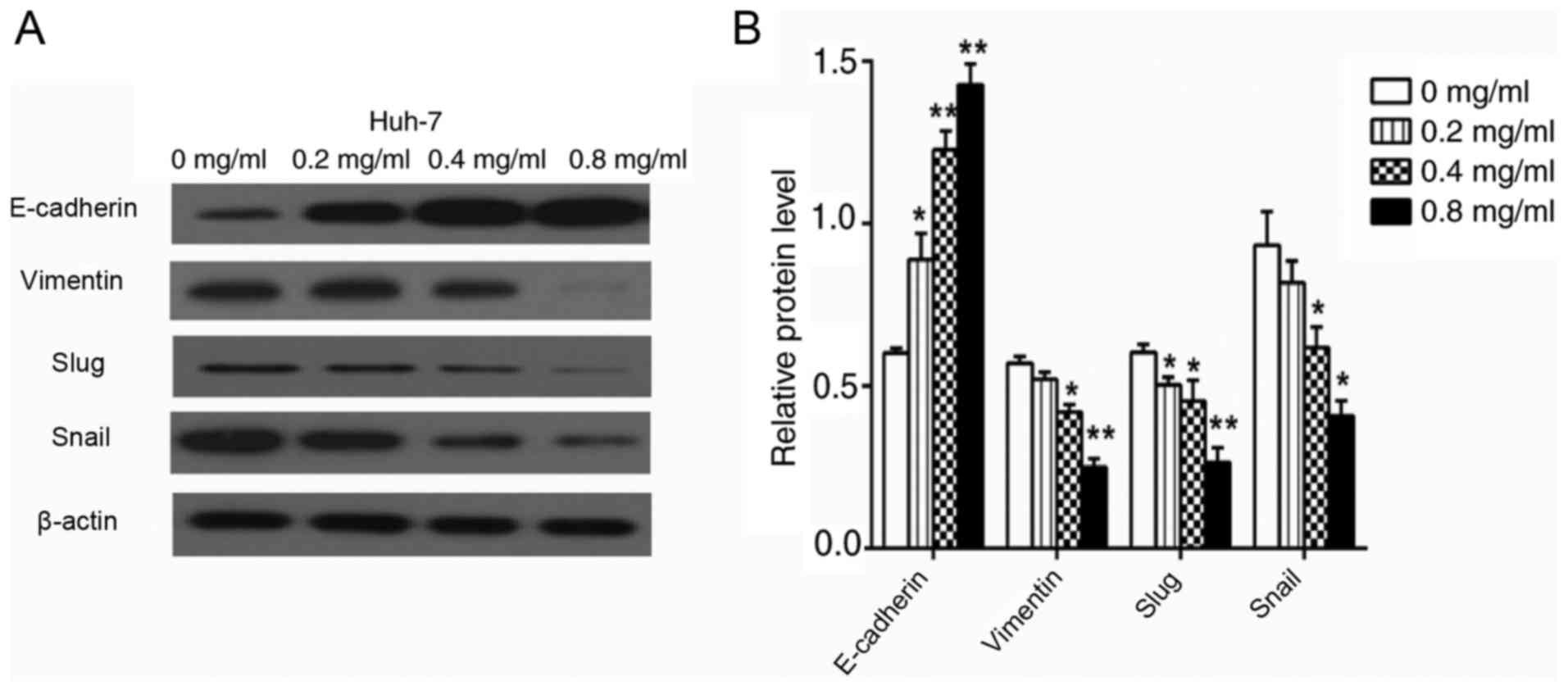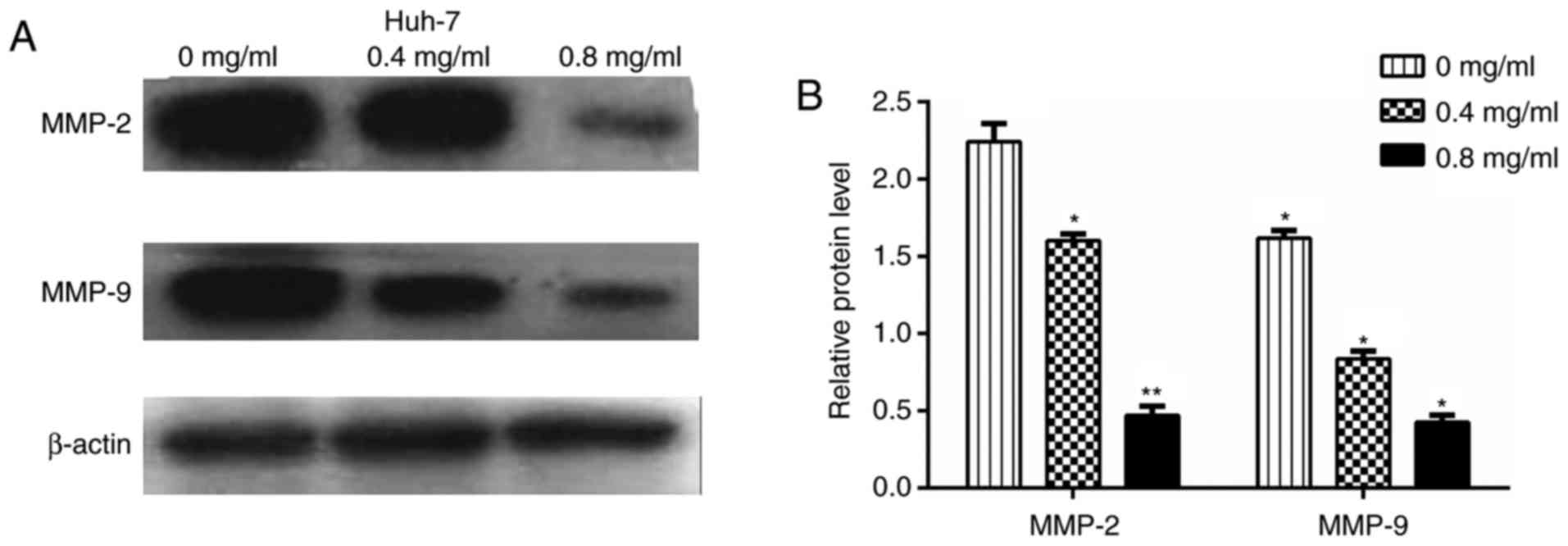|
1
|
Berreta M, Rinaldi L, Di Benedetto F,
Lleshi A, De Re V, Facchini G, De Paoli P and Di Francia R:
Angiogenesis inhibitors for the treatment of hepatocellular
carcinoma. Front Pharmacol. 7:4282016.PubMed/NCBI
|
|
2
|
Germano D and Daniele B: Systemic therapy
of hepatocellular carcinoma: Current status and future
perspectives. World J Gastroenterol. 20:3087–3099. 2014. View Article : Google Scholar : PubMed/NCBI
|
|
3
|
Ingle PV, Samsudin SZ, Chan PQ, Ng MK,
Heng LX, Yap SC, Chai AS and Wong AS: Development and novel
therapeutics in hepatocellular carcinoma: A review. Ther Clin Risk
Manag. 12:445–455. 2016. View Article : Google Scholar : PubMed/NCBI
|
|
4
|
Knox JJ, Qin R, Strosberg JR, Tan B,
Kaubisch A, El-Khoueiry AB, Bekaii-Saab TS, Rousey SR, Chen HX and
Erlichman C: A phase II trial of bevacizumab plus temsirolimus in
patients with advanced hepatocellular carcinoma. Invest New Drugs.
33:241–246. 2015. View Article : Google Scholar : PubMed/NCBI
|
|
5
|
Chaffer CL, Juan San BP, Lim E and
Weinberg RA: EMT, cell plasticity and metastasis. Cancer Metastasis
Rev. 35:645–654. 2016. View Article : Google Scholar : PubMed/NCBI
|
|
6
|
Zhou SL, Zhou ZJ, Hu ZQ, Li X, Huang XW,
Wang Z, Fan J, Dai Z and Zhou J: CXCR2/CXCL5 axis contributes to
epithelial-mesenchymal transition of HCC cells through activating
PI3K/Akt/GSK-3β\snail signaling. Cancer Lett. 358:124–35. 2015.
View Article : Google Scholar : PubMed/NCBI
|
|
7
|
Darroli AA, Hink MA, DuBuc TQ, Teunisse
BJ, Goedhart J, Röttinger E and Postma M: Domain analysis of the
nematostella vectensis snail ortholog reveals unique nucleolar
localization that depends on the zinc-finger domains. Sci Rep.
5:121472015. View Article : Google Scholar : PubMed/NCBI
|
|
8
|
Luo Z, Wang Q, Lau WB, Lau B, Xu L, Zhao
L, Yang H, Feng M, Xuan Y, Yang Y, et al: Tumor microenvironment:
The culprit for ovarian cancer metastasis? Cancer Lett.
377:174–182. 2016. View Article : Google Scholar : PubMed/NCBI
|
|
9
|
Chen CM, Hsieh SC, Lin CL, Lin YS, Tsal JP
and Hsieh YH: Alpha-mangostin suppresses the metastasis of human
renal carcinoma cells by targeting MEK/ERK expression and MMP9
transcription activity. Cell Physiol Biochem. 44:1460–1470. 2017.
View Article : Google Scholar : PubMed/NCBI
|
|
10
|
Kean MJ, Williams KC, Skaiski M, Myers D,
Burtnik A, Foster D and Coppolino MG: VAMP3, syntaxin-13 and SNAP23
are involved in secretion of matrix metalloproteinases, degradation
of the extracellular matrix and cell invasion. J Cell Sci.
122:4089–4098. 2009. View Article : Google Scholar : PubMed/NCBI
|
|
11
|
Horejs CM, Serio A, Purvis A, Gormley AJ,
Bertazzo S, Poliniewicz A, Wang AJ, DiMaggio P, Hohenester E and
Stevens MM: Biologically-active laminin-111 fragment that modulates
the epithelial-to-mesenchymal transiton in embryonic stem cells.
Proc Natl Acad Sci USA. 111:5908–5913. 2014. View Article : Google Scholar : PubMed/NCBI
|
|
12
|
Niu H, Zhang Y, Wu B, Zhang Y, Jiang H and
He P: Matrine induces the apoptosis of lung cancer cells through
downregulation of inhibitor of apoptosis proteins and the Akt
signaling pathway. Oncol Rep. 32:1087–1093. 2014. View Article : Google Scholar : PubMed/NCBI
|
|
13
|
Wang CY, Bai XY and Wang CH: Traditional
Chinese medicine: A treasured natural resource of anticancer drug
research and development. Am J Chin Med. 42:543–559. 2014.
View Article : Google Scholar : PubMed/NCBI
|
|
14
|
Ou X, Chen Y, Cheng X, Zhang X and He Q:
Potentiation of resveratrol-induced apoptosis by matrine in human
hepatoma HepG2 cells. Oncol Rep. 32:2803–2809. 2014. View Article : Google Scholar : PubMed/NCBI
|
|
15
|
Ding Y, Li X, Hong D, Jiang L, He Y and
Fang H: Slience of MACC1 decreases cell migration and invasion in
human maliganant melanoma through inhibiting the EMT. Biosci
Trends. 10:258–264. 2016. View Article : Google Scholar : PubMed/NCBI
|
|
16
|
Liu S, Ye D, Xu D, Liao Y, Zhang L, Liu L,
Yu W, Wang Y, He Y, Hu J, et al: Autocrine epiregulin activates
EGFR pathway for lung metastasis via EMT in salivary adenoid cystic
carcinoma. Oncotarget. 7:25251–25263. 2016.PubMed/NCBI
|
|
17
|
Beerling E, Seinstra D, de Wit E, Kester
L, van der Velden D, Maynard C, Schäfer R, van Diest P, Voest E,
van Oudenaarden A, et al: Plasticity between epithelial and
mesenchymal states unlinks EMT from metastasis-enhancing stem cell
capacity. Cell Rep. 14:2281–2288. 2016. View Article : Google Scholar : PubMed/NCBI
|
|
18
|
Ndo Goncalves N, Colombo J, Lopes JR,
Gelaleti GB, Moschetta MG, Sonehara NM, Hellmén E, Cde Zanon F,
Oliani SM and Zuccari DA: Effect of melatonin in epithelial
mesenchymal transition markers and invasive properties of breast
cancer stem cells of canine and human cell lines. PLoS One.
11:e01504072016. View Article : Google Scholar : PubMed/NCBI
|
|
19
|
Lin SY, Lee YX, Yu SL, Chang GC and Chen
JJ: Phosphatase of regenerating liver-3 inhibits invasiveness and
proliferation in non-small cell lung cancer by regulating the
epithelial-mesenchymal transition. Oncotarget. 7:21799–21811.
2016.PubMed/NCBI
|
|
20
|
Reig M, Mariño Z, Perelló C, Iñarrairaegui
M, Ribeiro A, Lens S, Díaz A, Vilana R, Darnell A, Varela M, et al:
High rate of early tumor recurrence in patients with HCV-related
HCC undergoing interferon-free therapy. J Hepatol. 65:719–726.
2016. View Article : Google Scholar : PubMed/NCBI
|
|
21
|
Wu J, Hu G, Dong Y, Ma R, Yu Z, Jiang S,
Han Y, Yu K and Zhang S: Matrine induces Akt/mTOR signalling
inhibition-mediated autophagy and apoptosis in acute myeloid
leukaemia cells. J Cell Mol Med. 21:1171–1181. 2017. View Article : Google Scholar : PubMed/NCBI
|
|
22
|
Huang H, Du T, Xu G, Lai Y, Fan X, Chen X,
Li W, Yue F, Li Q, Liu L and Li K: Matrine suppresses invasion of
castration-resistant prostate cancer cells by downregulating
MMP-2/9 via NF-κM signaling pathway. Int J Oncol. 50:640–648. 2017.
View Article : Google Scholar : PubMed/NCBI
|
|
23
|
Wu L, Wang G, Liu S, Wei J, Zhang S, Li M,
Zhou G and Wang L: Synthesis and biological evaluation of matrine
derivatives containing benzo-enpyrone structure as potent anti-lung
cancer agents. Sci Rep. 6:359182016. View Article : Google Scholar : PubMed/NCBI
|
|
24
|
Liu Y, Qi Y, Bai ZH, Ni CX, Ren QH, Xu WH,
Xu J, Hu HG, Qiu L, Li JZ, et al: A novel matrine derivate inhibits
differentiated human hepatoma cells and hepatic cancer stem-like
cells by suppressing PI3K/AKT signaling pathways. Acta Pharmacol
Sin. 38:120–132. 2017. View Article : Google Scholar : PubMed/NCBI
|
|
25
|
Sato R, Semba T, Saya H and Arima Y:
Concise review: Stem cells and epithelial-mesenchymal transition in
cancer: Biological implications and therapeutic targets. Stem
Cells. 34:1997–2007. 2016. View Article : Google Scholar : PubMed/NCBI
|
|
26
|
Bronsert P, Enderle-Ammour K, Bader M,
Timme S, Kuehs M, Csanadi A, Kayser G, Kohler I, Bausch D, Hoeppner
J, et al: Cancer cell invasion and EMT marker expression: A
three-dimensional study of the human cancer-host interface. J
Pathol. 234:410–422. 2014. View Article : Google Scholar : PubMed/NCBI
|
|
27
|
Canesin G, Cuevas EP, Santos V,
López-Menéndez C, Moreno-Bueno G, Huang Y, Csiszar K, Portillo F,
Peinado H, Lyden D and Cano A: Lysyl oxidase-like 2 (LOXL2) and E47
EMT factor: Novel partners in E-cadherin repression and early
metastasis colonization. Oncogene. 34:951–964. 2015. View Article : Google Scholar : PubMed/NCBI
|
|
28
|
Qu M, Yu J, Liu H, Ren Y, Ma C, Bu X and
Lan Q: The candidate tumor suppressor gene SLC8A2 inhibits
invasion, angiogenesis and growth of glioblastoma. Mol Cells.
40:761–772. 2017.PubMed/NCBI
|
|
29
|
Zhang J, Liu D, Feng Z, Mao J, Zhang C, Lu
Y, Li J, Zhang Q, Li Q and Li L: MicroRNA-138 modulates metastasis
and EMT in breast cancer cells by targeting vimentin. Biomed
Pharmacother. 77:135–141. 2016. View Article : Google Scholar : PubMed/NCBI
|
|
30
|
Islam SS, Mokhtari RB, El Hout Y, Azadi
MA, Alauddin M, Yeger H and Farhat WA: TGF-β1 induces EMT
reprogramming of porcine bladder urothelial cells into collagen
producing fibroblasts-like cells in a Smad2/Smad3-dependent manner.
J Cell Commun Signal. 8:39–58. 2014. View Article : Google Scholar : PubMed/NCBI
|
|
31
|
Wu YM, Chen ZJ, Liu H, Wei WD, Lu LL, Yang
XL, Liang WT, Liu T, Liu HL, Du J and Wang HS: Inhibition of ERRα
suppresses epithelial mesenchymal transition of triple negative
breast cancer cells by directly targeting fibronectin. Oncotarget.
6:25588–25601. 2015.PubMed/NCBI
|
|
32
|
Jin Y, Shenoy AK, Doernberg S, Chen H, Luo
H, Shen H, Lin T, Tarrash M, Cai Q, Hu X, et al: FBXO11 promotes
ubiquitination of the Snail family of transcription factors in
cancer progression and epidermal development. Cancer Lett.
362:70–82. 2015. View Article : Google Scholar : PubMed/NCBI
|
|
33
|
Verdone JE, Parsana P, Veltri RW and
Pienta KJ: Epithelial-mesenchymal transition in prostate cancer is
associated with quantifiable changes in nuclear structure.
Prostate. 75:218–224. 2015. View Article : Google Scholar : PubMed/NCBI
|
|
34
|
Colangelo T, Fucci A, Votino C, Sabatino
L, Pancione M, Laudanna C, Binaschi M, Bigioni M, Maggi CA, Parente
D, et al: MicroRNA-130b promotes tumor development and is
associated with poor prognosis in colorectal cancer. Neoplasia.
15:1086–1099. 2013. View Article : Google Scholar : PubMed/NCBI
|
|
35
|
Lv XQ, Qiao XR, Su L and Chen SZ: Honokiol
inhibits EMT-mediated motility and migration of human non-small
cell lung cancer cells in vitro by targeting c-FLIP. Acta Pharmacol
Sin. 37:1574–1586. 2016. View Article : Google Scholar : PubMed/NCBI
|
|
36
|
Tong D, Liu Q, Liu G, Xu J, Lan W, Jiang
Y, Xiao H, Zhang D and Jiang J: Metformin inhibits
castration-induced EMT in prostate cancer by repressing
COX2/PGE2/STAT3 axis. Cancer Lett. 389:23–32. 2016. View Article : Google Scholar : PubMed/NCBI
|
|
37
|
Kim EK, Choi EJ and Debnath T: Role of
phytochemicals in the inhibition of epithelial-mesenchymal
transition in cancer metastasis. Food Funct. 7:3677–3685. 2016.
View Article : Google Scholar : PubMed/NCBI
|
|
38
|
Kallifatidis G, Hoy JJ and Lokeshwar BL:
Bioactive natural products for chemoprevention and treatment of
castration-resistant prostate cancer. Semin Cancer Biol.
40–41:160–169. 2016. View Article : Google Scholar
|
|
39
|
Murden K, San KK, Martino A and Ezekiel U:
The effect of phytochemicals on a chemoresistant,
epithelial-mesenchymal transitioned, colorectal cancer cell line.
FASEB J. 30(1090): 22016.
|
|
40
|
Wang Z, Wu Y, Wang Y, Jin Y, Ma X, Zhang Y
and Ren H: Matrine inhibits the invasive properties of human glioma
cells by regulating epithelial-to-mesenchymal transition. Mol Med
Rep. 11:3682–3686. 2015. View Article : Google Scholar : PubMed/NCBI
|
|
41
|
Lim W, Yang C, Bazer FW and Song G:
Luteolin inhibits proliferation and induces apoptosis of human
placental choriocarcinoma cells by blocking the PI3K/AKT pathway
and regulating sterol regulatory element binding protein activity.
Biol Reprod. 95:822016. View Article : Google Scholar : PubMed/NCBI
|
|
42
|
Winnay JN, Solheim MH, Dirice E, Sakaguchi
M, Noh HL, Kang HJ, Takahashi H, Chudasama KK, Kim JK, Molven A, et
al: PI3-kinase mutation linked to insulin and growth factor
resistance in vivo. J Clin Invest. 126:1401–1412. 2016. View Article : Google Scholar : PubMed/NCBI
|
|
43
|
Jing X, Cheng W, Wang S, Li P and He L:
Resveratrol induces cell cycle arrest in human gastric cancer
MGC803 cells via the PTEN-regulated PI3K/Akt signaling pathway.
Oncol Rep. 35:472–478. 2016. View Article : Google Scholar : PubMed/NCBI
|
|
44
|
Su R, Nan H, Guo H, Ruan Z, Jiang L, Song
Y and Nan K: Associations of components of PTEN/AKT/mTOR pathway
with cancer stem cell markers and prognostic value of these
biomarkers in hepatocellular carcinoma. Hepatol Res. 46:1380–1391.
2016. View Article : Google Scholar : PubMed/NCBI
|
|
45
|
Jin H, Sun Y, Wang S and Cheng X: Matrine
activates PTEN to induce growth inhibition and apoptosis in
V600EBRAF harboring melanoma cells. Int J Mol Sci. 14:16040–16057.
2013. View Article : Google Scholar : PubMed/NCBI
|
|
46
|
Du R, Liu Z, Hou X, Fu G, An N and Wang L:
Trichostatin A potentiates genistein-induced apoptosis and reverses
EMT in HEp2 cells. Mol Med Rep. 13:5045–5052. 2016. View Article : Google Scholar : PubMed/NCBI
|
|
47
|
Ru NY, Wu J, Chen ZN and Bian H:
HAb18b18G/CD147 is involved in TGF-β-induced epithelial-mesenchymal
transition and hepatocellular carcinoma invasion. Cell Biol Int.
39:44–51. 2015. View Article : Google Scholar : PubMed/NCBI
|















